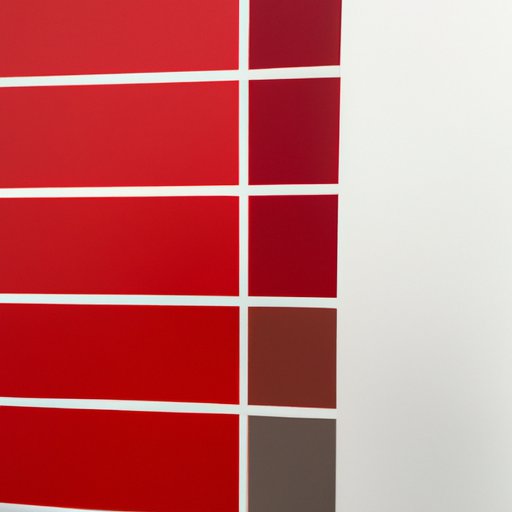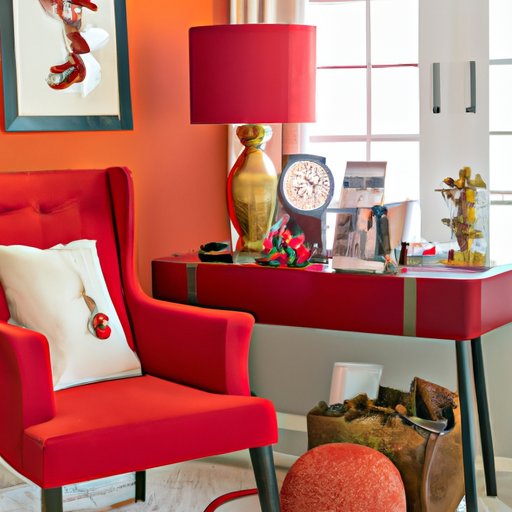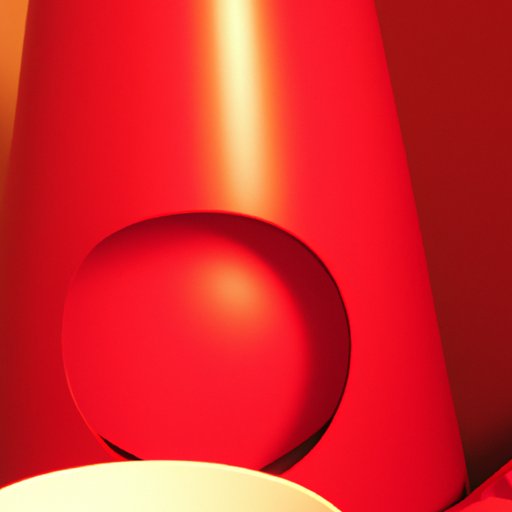Introduction
Red is a powerful and vibrant colour that can be used to make a bold statement in interior design, fashion, art, and many other areas. But when it comes to pairing red with other colours, it can be difficult to know which hues work best. To help you create stunning colour combinations with red, this comprehensive guide will provide an overview of colour theory and explore all the different ways to mix red with other shades.

An Exploration of Complementary Color Combinations with Red
Before we dive into creating colour combinations with red, let’s first take a look at the basics of colour theory. All the colours in the spectrum are derived from three primary colours – red, yellow, and blue – which cannot be created by mixing any other colours. From these three primary colours, more complex secondary and tertiary colours can be formed.
Primary Colors
The primary colours are red, yellow, and blue. These three shades form the foundation of the colour wheel, and they are the only colours that cannot be created by mixing other colours. When combined with one another in equal proportions, the primary colours create a neutral black or grey.
Secondary Colors
Secondary colours are created when two primary colours are mixed together in equal parts. The secondary colours are orange (made from red and yellow), green (made from blue and yellow), and purple (made from blue and red).
Tertiary Colors
Tertiary colours are created when a primary colour is mixed with a secondary colour. There are six tertiary colours in total – red-orange, yellow-orange, yellow-green, blue-green, blue-purple, and red-purple.
The Power of Contrast: How to Use Red and Other Colors to Create a Bold Statement
When pairing red with other colours, there are many different approaches you can take. One of the most effective ways to combine red with other shades is to use contrasting colours. By combining colours that are opposite each other on the colour wheel, you can create a striking and visually interesting palette.
Monochromatic Palettes
Monochromatic palettes feature different shades of the same colour. This type of colour combination is perfect for creating a subtle yet sophisticated look. To create a monochromatic palette with red, try using different shades of red such as cherry, scarlet, and crimson.
Analogous Colors
Analogous colours are those that are located next to each other on the colour wheel. For example, red, orange, and yellow are analogous colours. This type of colour combination is great for creating a harmonious and balanced look.
Triadic Colors
Triadic colours are those that are evenly spaced around the colour wheel. For example, red, yellow, and blue are triadic colours. This type of colour combination is perfect for creating a bold and vibrant look.

Harmonious Palettes Featuring Red and Other Colors
In addition to using contrasting colours, you can also create harmonious palettes by combining colours that are close to each other on the colour wheel. Here are some ideas for combining red with other shades to create a harmonious palette.
Shades of Red
One way to create a harmonious palette with red is to pair it with other shades of red. This type of colour combination is great for creating a unified look. Try combining different shades of red such as burgundy, rose, and mahogany.
Neutrals
Neutral colours such as white, black, and grey are great for pairing with red. This type of colour combination is perfect for creating a classic and timeless look. Try combining red with shades of grey such as charcoal, dove, and ash.
Accent Colors
Accent colours are those that are close to red on the colour wheel. This type of colour combination is perfect for creating a warm and inviting look. Try combining red with accent colours such as orange, yellow, and pink.

Styling with Red: Expert Tips for Matching Red with Other Colors
When it comes to styling with red, there are a few key tips to keep in mind. Here are some expert tips for matching red with other colours.
Balance
When creating a colour palette with red, it’s important to create a sense of balance and harmony. Try to use a variety of tones and shades to create a balanced look.
Proportion
When pairing red with other colours, pay attention to the proportion of each colour in the palette. Make sure that the red isn’t overpowering the other shades.
Texture
Texture can play an important role in creating a successful colour palette with red. Try combining different textures such as velvet, silk, and leather to add depth and interest to the look.
Patterns
Patterns are a great way to add visual interest to a colour palette with red. Try experimenting with different patterns such as stripes, polka dots, and floral prints to create a unique look.
Creating a Jaw-Dropping Look with Red and Other Colors
When it comes to creating a jaw-dropping look with red, there are a few key tips to keep in mind. Here are some tips for creating a stunning colour palette with red.
Think Outside the Box
When creating a colour palette with red, don’t be afraid to think outside the box. Try experimenting with unexpected colour combinations such as yellow and pink or blue and orange to create a unique look.
Select a Focal Point
When creating a colour palette with red, it’s important to select a focal point. This could be a piece of furniture, an artwork, or even a rug. Once you have selected your focal point, use it as the starting point for your colour palette.
Consider Lighting
Lighting can have a big impact on how a colour palette looks. Make sure to consider the type of lighting in the room, as this can affect how the colours appear.
Conclusion
This comprehensive guide has explored all the different ways to create stunning colour combinations with red. From understanding the basics of colour theory to exploring complementary colour combinations and harmonious palettes, this guide has provided an overview of all the different ways to mix red with other shades. By following the tips outlined in this guide, you can create a jaw-dropping look with red and other colours.
(Note: Is this article not meeting your expectations? Do you have knowledge or insights to share? Unlock new opportunities and expand your reach by joining our authors team. Click Registration to join us and share your expertise with our readers.)
